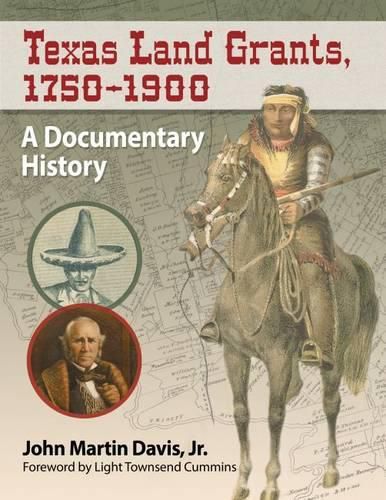Readings Newsletter
Become a Readings Member to make your shopping experience even easier.
Sign in or sign up for free!
You’re not far away from qualifying for FREE standard shipping within Australia
You’ve qualified for FREE standard shipping within Australia
The cart is loading…






The roots of Texas spring forth from the soil. That heritage harkens back to royal devises in recognition of conquests, exploration and colonization. Prompted by titles and lands, adventurers established Spanish enclaves in the New World. Others ventured beyond the outposts into the frontier. Close behind were traders and opportunist. Land east of the Rio Grande was often described simply as
Great Space of Land Unknown . A Commissioner of the Texas General Land Office once reminded lawmakers that land unsettled was wilderness. Policies of all sovereigns in Texas encouraged filling that void. After its independence from Spain, Mexico launched a generous land grant program through contractors agreeing to recruit emigrants to settle in their concessions. Mexican, European and Anglo colonist responded to the offer. Emigrants before receiving a grant had to swear allegiance to Mexico, convert to the state religion and pay survey costs and land dues. After the Texas Revolution, a system of Castilian edicts and English common law formed the basis of the Texas land system. The General Land Office oversaw surveys, patents and issuance of marketable titles. Because of the absence of hard currency, Texas land became the coin of the realm. Like the sovereigns before it, the Republic gave generous grants to loyal first families and veterans. Multiple homestead programs were available until the public domain was appropriated. Over two hundred million acres were patented before the end of the century. Texas schools, railroads and war veterans benefitted from other land grants. Some military warrants and land scrip went awry. Speculation, schemes and fraud were sometimes present but seldom proved. By close examination of special acts, charters and subsequent litigation, schemes were revealed. These Texas
family secrets
have long been closeted. This documented legal and fiscal history of Texas land grants reveals the good, bad and ugly of the greatest state distribution of land in the United States.
$9.00 standard shipping within Australia
FREE standard shipping within Australia for orders over $100.00
Express & International shipping calculated at checkout
The roots of Texas spring forth from the soil. That heritage harkens back to royal devises in recognition of conquests, exploration and colonization. Prompted by titles and lands, adventurers established Spanish enclaves in the New World. Others ventured beyond the outposts into the frontier. Close behind were traders and opportunist. Land east of the Rio Grande was often described simply as
Great Space of Land Unknown . A Commissioner of the Texas General Land Office once reminded lawmakers that land unsettled was wilderness. Policies of all sovereigns in Texas encouraged filling that void. After its independence from Spain, Mexico launched a generous land grant program through contractors agreeing to recruit emigrants to settle in their concessions. Mexican, European and Anglo colonist responded to the offer. Emigrants before receiving a grant had to swear allegiance to Mexico, convert to the state religion and pay survey costs and land dues. After the Texas Revolution, a system of Castilian edicts and English common law formed the basis of the Texas land system. The General Land Office oversaw surveys, patents and issuance of marketable titles. Because of the absence of hard currency, Texas land became the coin of the realm. Like the sovereigns before it, the Republic gave generous grants to loyal first families and veterans. Multiple homestead programs were available until the public domain was appropriated. Over two hundred million acres were patented before the end of the century. Texas schools, railroads and war veterans benefitted from other land grants. Some military warrants and land scrip went awry. Speculation, schemes and fraud were sometimes present but seldom proved. By close examination of special acts, charters and subsequent litigation, schemes were revealed. These Texas
family secrets
have long been closeted. This documented legal and fiscal history of Texas land grants reveals the good, bad and ugly of the greatest state distribution of land in the United States.